Cadiz is a fascinating and historic port city – one of the oldest in Europe, dating back 3,000 years – where the term “travelling deeper” is taken to a whole new level.
Spending time in historic Cadiz inspires you to look underground to ancient civilizations, to the horizon where trading ships sailed to the New World, and down from the rooftops to see the famous watchtowers.
Whilst there, you can’t help but succumb to the easy-going attitude of the gaditanos – relax, eat well, and savour everyday life.
1. Torre Tavira
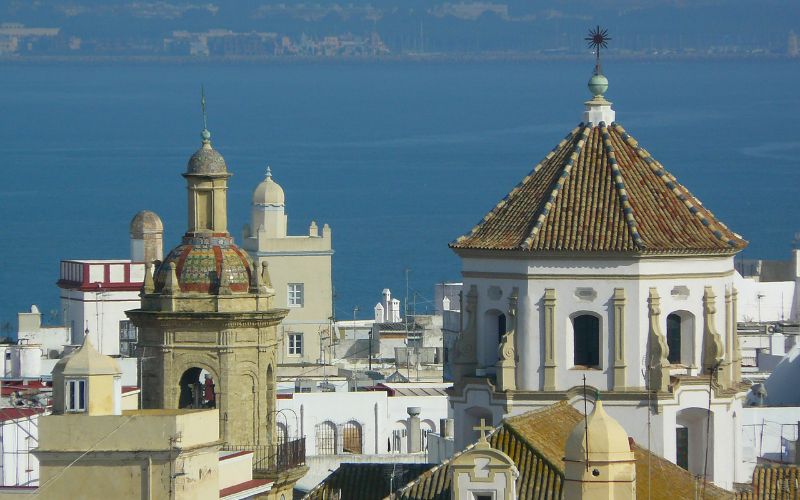
Torre Tavira is an eighteenth-century watchtower, one of 160 watchtowers of Cadiz (four different styles of towers are pictured above), of which around 130 remain today. Torre Tavira itself is the highest point in the city, at 45m – at the top there is a camera obscura where you can enjoy an incredible view over the streets of Cadiz.
The towers were built so that merchants could watch their ships arriving loaded with valuable cargo such as tobacco, coffee and sugar. Cadiz’s importance grew from 1717, when the port took over from Seville as the main gateway for New World trade.
Address: Calle Marqués del Real Tesoro 10, 11001 Cádiz
Website: Torretavira.com
2. Playa La Caleta
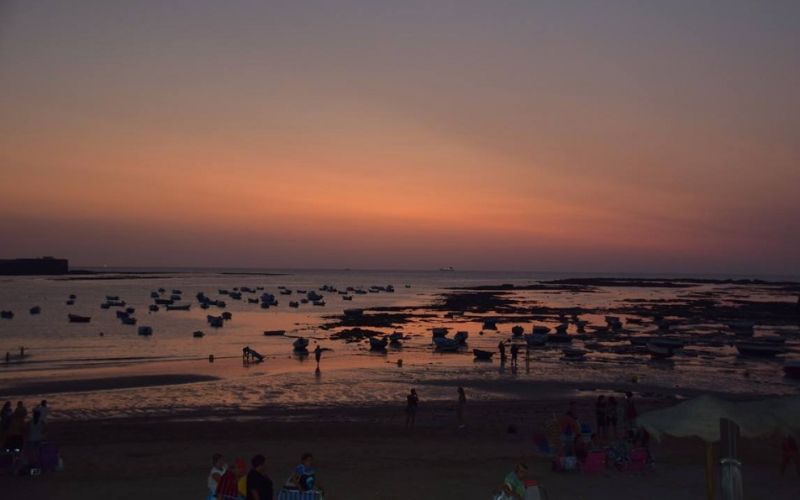
Cadiz city is a peninsula surrounded on three sides by the Atlantic, so a day on the beach involves a short stroll wherever you are.
La Caleta is a crescent-shaped sweep of sand, bookended by fortresses. After a day’s sightseeing, grab a drink at a chiringuitos (beach bar) and watch the sun set over the bay, or head along the causeway to San Sebastian castle (see below, currently closed, though the walk is still worth it).
If the beach looks familiar, think Halle Berry walking out of the sea towards Pierce Brosnan’s James Bond in Die Another Day; Cadiz doubled as Havana.
3. Cathedral

Cadiz Cathedral is one of Andalucia’s most iconic cathedrals, with its towers and domes visible from the seafront – it took more than100 years to build.
With its striking gold-hued dome, silver collection, and extraordinary circular crypt housing the tomb of composer Manuel Falla (contemporary of Debussy, Ravel and Lorca) the “new cathedral” is well worth a visit.
Don’t miss the climb up the eastern Clock Tower (warning: the bells chime every 15 minutes) – for the city and sea views
Address: Plaza de la Catedral, s/n, 11005 Cádiz.
Website: Catedraldecadiz.com
4. Iglesia de Santa Cruz

Turismo Cadiz ©
Iglesia de Santa Cruz is the “old cathedral” of Cadiz, located next to its much larger successor, with a long and colourful history.
Originally built by King Alfonso the Wise in the 13th century (over what was originally a mosque, like so many churches in Spain), the gothic Santa Cruz was burned by English pirates 300 years later.
It was reconstructed as a baroque basilica using wealth from the city’s trade with the Indies, and was the city’s cathedral until 1834.
Address: Plaza Fray Félix, 6, 11005 Cádiz
5. Mercado Central
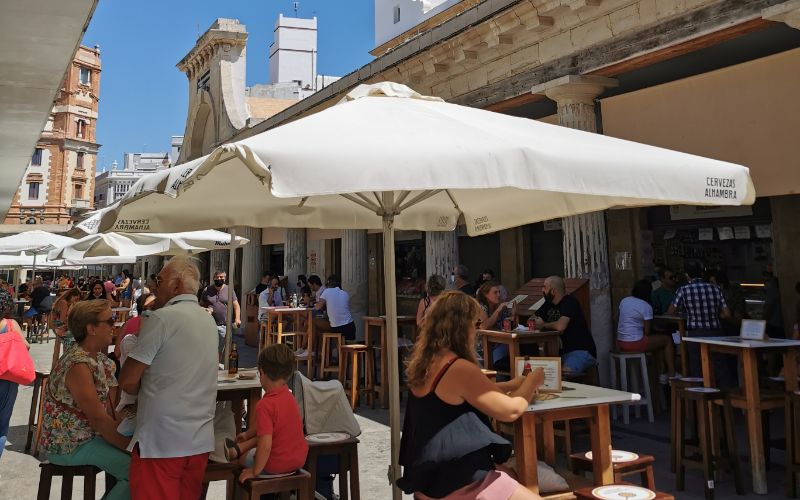
Cadiz’s main market, Mercado Central located close to the seafront, welcomes you with abundant stalls of local fresh fruit, vegetables, meat and especially fish and seafood caught in waters around the city.
Even better, enjoy the buzzing ambience and delicious bites of the tapas stalls (especially busy at weekends) in the lovely colonnades with plenty of seating. Try Jamón Ibérico ham, Mojama de Atún salty cured tuna, sushi, Sherry wines and authentic Spanish croquetas – different flavours croquettes – it’s foodie heaven!
Address: Plaza de la Libertad, S/N, 11005 Cádiz.
Website: Mercado Central

6. Pause in a Plaza
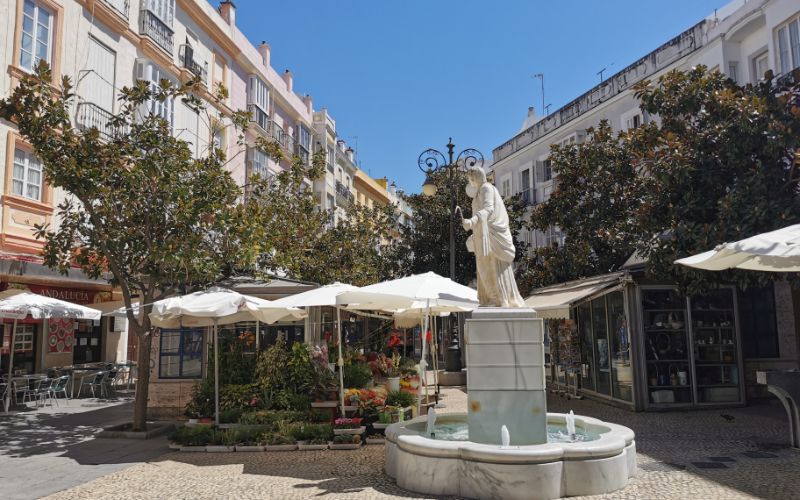
When visiting Cadiz, we love to meander and stop for coffees (or something stronger) in one of the pretty squares that dot the old town.
Plaza Topete close to the Mercado Central, known for its flower stalls, and nearby Plaza de la Candelaria, with its verdant foliage, are two favourites. The city’s plazas are especially stunning in spring – look out for floss-silk, magnolia, and jacaranda trees.
7. archaeological Site Of Gadir
Cadiz has a superb archaeological museum, which houses remains from Gadir, the Phoenician settlement that existed 3,000 years ago where Cadiz city is located today.
An excellent audio-visual presentation takes you back in time to discover life for those who lived and worked here, followed by a guided tour of the site of eight houses, which includes virtual recreations of rooms as they were originally – details like kitchen pots are seen being used.
Traders from Phoenicia (the eastern coast of the Mediterranean) brought prized olive oil and wine from Cadiz, and you can also see Roman fish-salting basins.
Address: Calle San Miguel 15, 11001 Cádiz.
Website: Yacimiento Arqueológico Gadir
8. Genovés Park
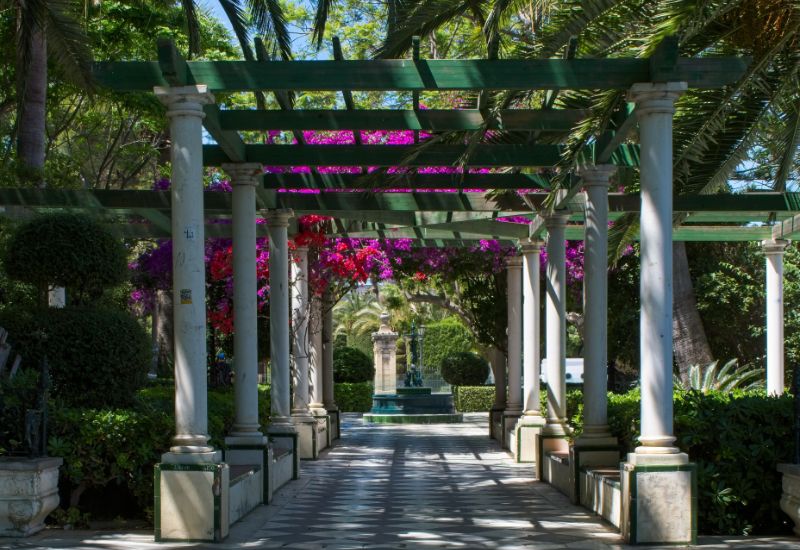
Genoves Park and botanic gardens sit beside the sea in the north-western corner of the old city, a delightful green space with a playground, fountains and a great place for little legs to run off excess energy, or to meander after a long lunch.
In the park you can find specimens of vibrant bougainvillea, as well as less common South-American ombu tree, gingko and drago.
Address: Parque Genovés, Av. Dr. Gómez Ulla, s/n, 11003 Cádiz
9. Museum of Cadiz
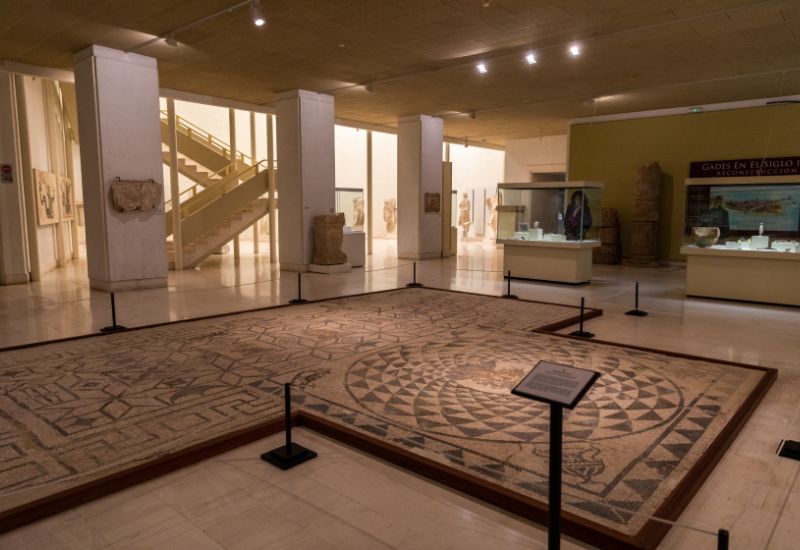
From archaeological artifacts, to art and puppets, the Museum of Cadiz is an interesting way to spend a couple of hours.
This museum on Plaza Mina, housed in a former convent and set over three floors, houses traditional “Tia Norica” puppets, of Italian origin; 16th to 20th-century paintings by Murillo and Rubens and archaeological remains.
Must-sees include two enormous marble Phoenician sarcophagi of a man and a woman, dating from the fifth century BC, the exquisite gold jewellery found alongside them, and impressive Roman mosaics.
Address: Plaza de Mina, s/n, 11004 Cádiz.
Website Museo de Cadiz
10. Castillo de Santa Catalina
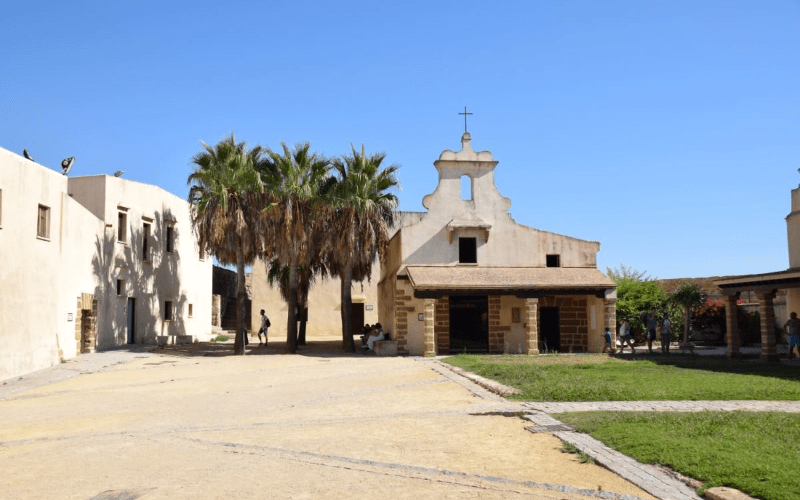
Castillo de Santa Clara sits at the northern end of La Caleta beach. This curiously-shaped castle, originally built in 1598, was part of the coastal fortification system built after the Anglo-Dutch sacking of the city.
Here, you can follow a route called Castles and Bulwarks which takes you to all the defensive structures around the city.
Built in an Italian bastion fort style, with star-type points (enabling flanking fire at invaders), it was used by the Ministry of Defence until 1991. Today it is a cultural space, holding contemporary art exhibitions and outdoor activities in summer, as well as offering great views of the city and sea.
Address: Calle Campo de las Balas, s/n, 11002 Cádiz.
Website: Castillo de Santa Catalina
11. Plaza de San Juan de Dios
Plaza de San Juan is the former Plaza Mayo, (main square) of Cadiz, also known as La Corredera, and is a great place to start discovering the city.
At the southern end of the long, narrow square, is the City Hall, while at the other extreme, close to the port, is the Tourist Office – well worth a stop for information on attractions and events; underneath is a spacious underground car park, ideally situated for those arriving using their own transport.
12. Teatro Romano
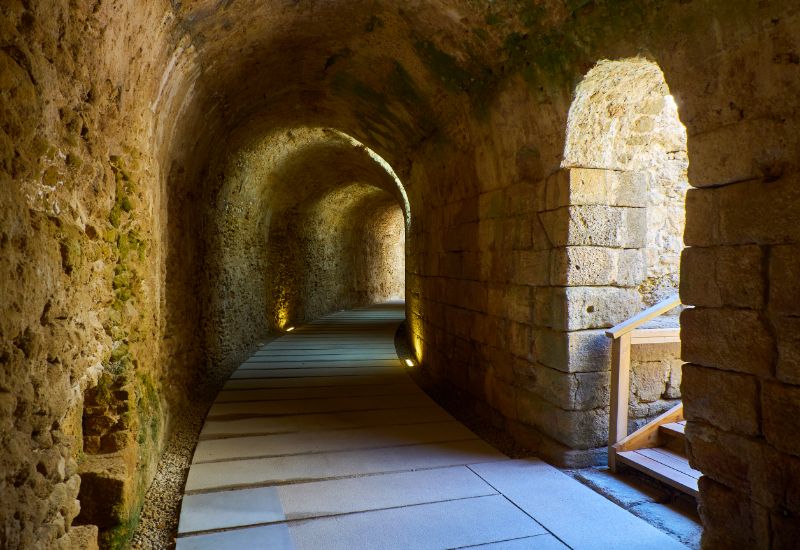
The Roman theatre near the cathedral, built in 70 B.C and discovered in 1980 while being partially excavated, is the oldest, and second largest, on the Iberian Peninsula.
The theatre has an unusual horseshoe-shaped cavea (seating section) for 20,000 spectators in total.
Note that the entrance is down a tiny street near the cathedral, Calle Meson. When it’s closed, you can still catch a glimpse from nearby Calle Silencio.
Address: Calle Mesón, 11, 11005 Cádiz.
Website: Roman Theatre Cadiz
13.(Museo del titere) Puppet Museum
A good family option, the Puppet Museum includes some interactive exhibits and is home to puppets from both Spain and also around the world, ranging in scale from life-size to hand-held. It celebrates the painstaking art of puppet-makers and puppeteers.
The museum is housed in the Puertas de Tierra – barracks located in the Moorish defensive walls at the city’s entrance, which feature spectacular restored brick arches.
Address: Puertas de Tierra, Bóvedas de Santa Elena, s/n, 11006 Cádiz
Website: Museo del Títere
14. See the Sunset at San Sebastian Castle
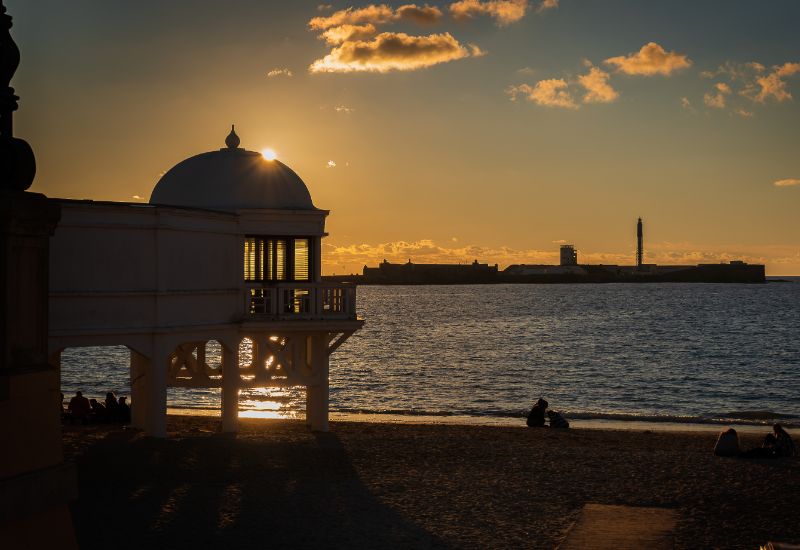
This castle and lighthouse are located on a small island linked to the city by a causeway (even at high tide) to the southern end of La Caleta beach. Local legend says that the island housed a temple to Tronos, god of the Titans and father of Zeus.
The 41m-tall iron lighthouse that you can see today is built over a Moorish watchtower, while a Venetian boat crew built a chapel to San Sebastian there in the 15th century, in thanks for escaping the plague.
In the James Bond film, Die Another Day (see La Caleta, above), the castle was used as a gene therapy clinic for the international super-wealthy.
Address: Paseo Fernando Quiñones, s/n, Cádiz
15. Oratory of San Felipe Neri Church

Andalucia.org ©
The San Felipe Neri Church is home to one of Murillo’s finest works, the Immaculate Conception, and one of the few examples of baroque elliptical arches in Andalucia.
The 17th-century church’s most important role was as seat of the Cortes Generales (National Assembly) when the first Spanish constitution, known as La Pepa, was declared in 1812 during Napoleon’s occupation of Spain.
You can see multiple plaques on the building’s façade celebrating this highly significant event. An adjoining museum offers further information about La Pepa, which limited the monarch’s power and enshrined citizens’ rights.
Address: Calle San José, 36, 11003 Cádiz
Website Oratorio de San Felipe Neri
16. Gran Teatro Falla

For an evening surrounded by 18th century grandeur, check out this neo-mudejar theatre in Cadiz old town – you can see concerts, plays, flamenco and other performances.
The official competition of carnival singing groups (COAC) is held here, starting in January each year. (See the theatre’s program here).
Address: Plaza Fragela, s/n, 11003 Cádiz.
Website: Gran Teatro Falla
17. Cueva catacumbas del beaterio
The catacombs, located six metres under the city, are much less morbid than you might imagine, with an incredible story which features a strong religious element.
Access to the underground space is, in the most unlikely way, through a courtyard in a residential building. You can choose a guided or non-guided visit.
Address: Calle Valverde 3, 11004 Cádiz.
Website: Catacumbasdelbeaterio.com
18. Carnival
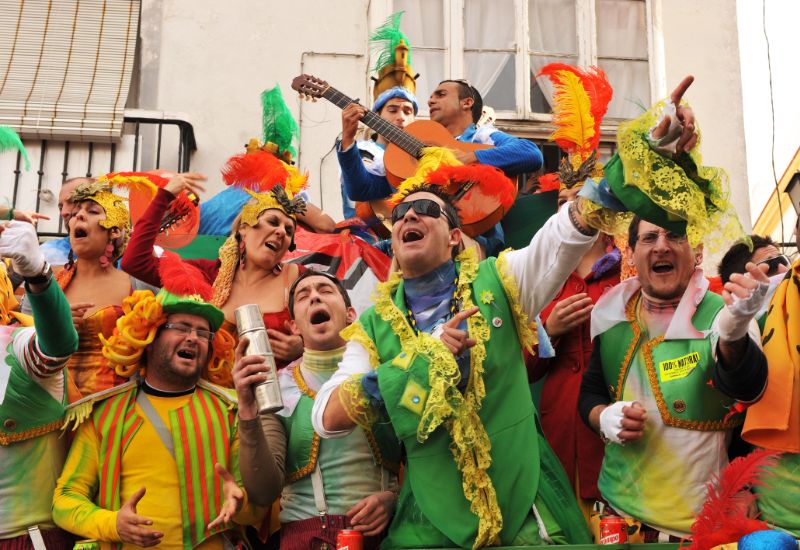
Cadiz Carnival is celebrated just before Lent, a lively week-long festival (including a weekend at either side) sees everyone take to the streets in fancy dress.
There’s traditional music from satirical singing groups that you can hear around the streets, and at the Teatro de Falla in the previous weeks (see above).
Carnaval takes place 40 days before Easter, in February or March. If you can’t see the festival itself, a new visitor centre, La Casa del Carnaval de Cadiz, explains its origins and elements. Although the texts are mostly in Spanish, the costumes on display and the videos showing the action are definitely worth seeing.
Further Details: The Carnival of Cádiz
19. Walk Around the Old Town
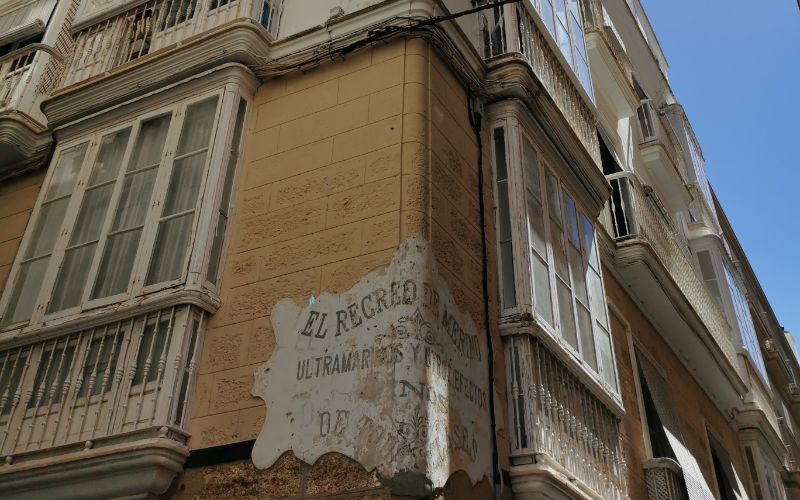
While visiting Cadiz, take in the city’s beautifully faded elegance and huge charm by wandering around two distinct areas: El Populo, the oldest area which dates back to Phoenician times and where you can find the Gadir Museum (see above), and La Viña, the old fisherman’s area, in the western part near La Caleta beach (see above).
Don’t miss Plaza Tío de la Tiza and Restaurant El Faro while you’re there.
20. Casa-Palacio Moreno de Mora

Cadiz.es ©
Casa Palacio Moreno de Mora is a fine example of an Isabelline-style neoclassical palace from the 1800s, with an impressive pink façade decorated in Carrera marble, featuring Ionic columns and glassed-in cast-iron balconies.
The elegant interior has beautiful patios and magnificent marble balustraded staircases, paintings by Zubarán, and late 19th-century Italian and French furniture designed specifically for the mansion. It is unusual in that all the original elements have been preserved intact.
Address: Calle Ancha, 28, 30, 11001 Cádiz. Only open via prior arrangement casapalaciodemora@gmail.com
21. Hospital de nuestra señora del carmen

A visit to this 18th-century former women’s hospital and church offers a magnificent El Greco painting of St Francis and a stunning central courtyard.
Inside the church, as well as the El Greco in the St Francis of Assisi Chapel, look out for the tiled panels of the Stations of the Cross, whose scenes are based on Italian and Flemish engravings from the 17th century.
Address: Calle Hospital de Mujeres 26, 11001 Cádiz
22. take the boat to el puerto de santa maria

Cadiz city is situated at the end of a peninsula so there is a regular boat service across to the mainland.
Take a day trip to El Puerto de Santa Maria, across the bay to the north – see the sights like the Castle of San Marcos where you can have a sherry tasting. Boats leave from the Terminal Maritima Cadiz, Avenida del Puerto 2B, 11006 Cádiz.
Address: Castillo de San Marcos, Plaza Alfonso X el Sabio 3, 11500 El Puerto de Santa María, Cádiz
Website: Castle of San Marcos
23. Casa de Iberoamerica
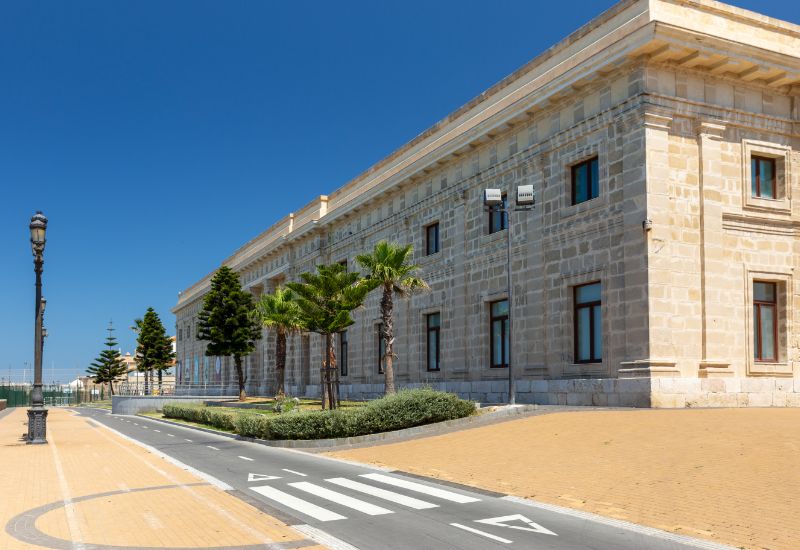
The Casa de Iberoamerica is a fine neoclassical building, a former prison and now an event and exhibition space with a full programme covering numerous areas such as culture, business, and academia. You can see concerts and other performances.
Address: Calle Concepción Arenal, s/n, 11006 Cádiz
24. Eat in a Michelin restaurant

© LÚ Cocina y Alma, Jerez De La Frontera
If you book early enough, you could enjoy one of the five Michelin-starred restaurants in Cadiz and the surrounding area.
Cadiz has a one-star restaurant, while nearby Jerez, home of sherry has two one-star establishments.
Higher up the scale, Chef Angel Leon has two restaurants recognised by the French guide: three-star Aponiente in neighbouring El Puerto de Santa Maria, one of only two restaurants in Andalucia boasting this highest accolade, and one-star Alevante, in Sancti Petri.
Check out our Michelin restaurants in Cadiz guide here.
Useful travel information
The most convenient airports for flights for Cadiz are to Seville, Malaga, Jerez, or Gibraltar airports.
How to get to Cadiz city by car
From Seville airport 129km / around 1hr 14min drive
From Malaga airport 225km / around 2hr 20min drive
From Jerez 34.9km / around 28min drive
From Gibraltar 118km / around 1hr 24min drive
From Marbella 177km / around 1hr 49min drive
Tempted you to discover Cadiz city? Have a look at our selection of villas on the Costa de la Luz.
You might also like





